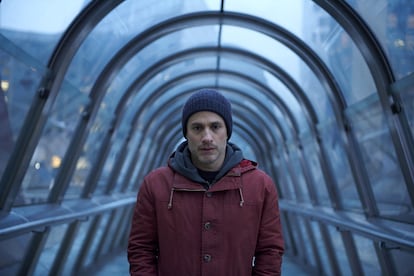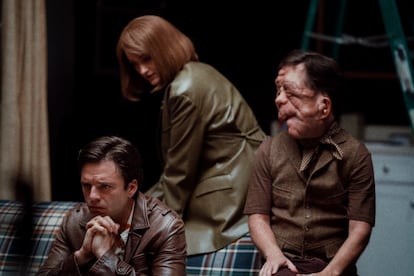Technological dystopias: The new futuristic cinema takes place in the present day
From a film about the possibility of resurrecting the dead to a genre remake of ‘Star Wars,’ several movies debuting at the Berlin International Film Festival speak of a future that looks very much like today’s world

They take place in a vaguely futuristic time, only a handful of years away, a decade, at most. They imagine an imminent future in which it will be possible to resurrect our dead for a few hours or completely change our faces to our liking. They project societies shaped by conflicts between opposing groups and by nostalgia for a better time that we did not know how to appreciate as we should. The new futuristic cinema presented at the Berlin International Film Festival imagines futures dominated by a series of neuroses, perhaps exacerbated by the pandemic, a memento mori from which we are still recovering, despite pretending that everything is fine. While mixed-reality glasses and cryogenics are now becoming an imminent reality, the festival responded by imagining trajectories that seem impossible, until the day the world decides to follow those paths. That is always the case with science fiction.
Futuristic cinema has always talked about the present, but rarely has it done so in such a transparent way. In the new film starring Gael García Bernal, set in the near future, mourning is no longer a mandatory experience but rather a voluntary one. New technologies make it possible to temporarily resurrect our loved ones, only in different bodies, lent by citizens in exchange for remuneration (the new sex work?). Directed by Piero Messina, Another End takes place in a multilingual and transnational society, but one that is dominated by a lack of communication and turned into a gigantic non-place, as if several modern plagues had swept through it. García Bernal plays a widower — a common character, perhaps not by chance, among the festival’s films — who agrees to spend a few extra days with his partner, who died in a brutal accident, and thus prepare for her death. In the film, weighed down by a permanent drive toward the intense and the glamorous, the simulacrum and the real experience are almost the same thing, and the suppression of pain at all costs has become a categorical imperative. Any resemblance to reality is purely coincidental.
In ‘Another End,’ the simulacrum and the real experience are almost the same thing, and the suppression of pain at all costs has become a categorical imperative. Any resemblance to reality is purely coincidental
Closer to the postulates of the B series, but revisited in an indie key (produced by A24, the Miramax of our time but free of the Weinsteins), A Different Man also imagines a time not too distant from our own, in which a facial surgery has been invented to change the lives of those who undergo it. Such is the case of Edward, who suffers from neurofibromatosis, a genetic disorder that causes facial deformities, as well as from permanent exclusion in his professional and emotional life. When he underwent this treatment, his disfigurement ended, women threw themselves at him and he achieved the success he had desired, but his insecurities did not disappear. Perhaps the problem was not his face, but him.
Directed by Aaron Schimberg, it is the Kafkaesque story of a normal man who becomes a monster, despite appearances to the contrary. It is a gothic tale of beauty and moral ugliness, with brilliant and hilarious moments; but there’s also a certain narrative muddle in the final part, which perhaps detracts from what could have been an extraordinary parody of an obsession with physical perfection, which is not new but may be on the rise (which is really saying something).

L’ empire, the new film by Bruno Dumont, also takes place in a future suspiciously similar to the present. A French village where nothing ever happens becomes the scene of a galactic battle between two extraterrestrial forces fighting for control of Earth. One wants to cause a new apocalypse and the other seeks to establish a kingdom of peace. Dumont, a philosophy professor who made a name for himself in the 1990s with his austere Cannes-acclaimed films like L’humanité, reinvents his cinema with this realist remake of Star Wars, ruled by an identical conflict between good and evil, which is admirable for its absolute brazenness: the spaceships are reconstructions of Gothic churches and the locals, played by non-professional actors, walk down the street with their laser swords, like everyday Jedi knights.
Subtexts abound: the struggle between clans with incompatible political projects is reminiscent of the present, as is the general psychosis about the disappearance of the world as we know it, which is less and less hypothetical. But, after a suggestive start, the film falls into an austerity that prevents any enjoyment. All that remains is perplexity, which is perhaps not enough.

If futuristic cinema has moved closer to realism, perhaps it is because reality is already a full-fledged dystopia. This was demonstrated by the outbreak of Covid-19, when many had the feeling of living inside a fictional work. For director Olivier Assayas, that feeling has not quite ended. His new film, Hors du temps, combines two registers that most would have avoided alternating: a lyrical commentary on the director’s childhood, which he narrates, in a house on the most bucolic outskirts of Paris, and a light comedy about the first lockdown, shot in that same country home. It is, perhaps, Assayas’s least demure film, exposing some of his private life, his conflicted relationship with his close friends, his bourgeois attachment to his heritage and his pronounced neuroses, which he does not treat with the sarcasm necessary to make them work on a comic level.
The film unravels our months-long reality, including its inflexible rules of social distance, its ephemeral Plexiglas worlds, industrial quantities of disinfectant and words we are quick to forget. And it reminds us that, back then, the Pfizer laboratory predicted that the pandemic would not completely disappear until 2024. Perhaps that is why the cinema is beginning to commemorate a time from which we did not emerge any better off.
Sign up for our weekly newsletter to get more English-language news coverage from EL PAÍS USA Edition
Tu suscripción se está usando en otro dispositivo
¿Quieres añadir otro usuario a tu suscripción?
Si continúas leyendo en este dispositivo, no se podrá leer en el otro.
FlechaTu suscripción se está usando en otro dispositivo y solo puedes acceder a EL PAÍS desde un dispositivo a la vez.
Si quieres compartir tu cuenta, cambia tu suscripción a la modalidad Premium, así podrás añadir otro usuario. Cada uno accederá con su propia cuenta de email, lo que os permitirá personalizar vuestra experiencia en EL PAÍS.
¿Tienes una suscripción de empresa? Accede aquí para contratar más cuentas.
En el caso de no saber quién está usando tu cuenta, te recomendamos cambiar tu contraseña aquí.
Si decides continuar compartiendo tu cuenta, este mensaje se mostrará en tu dispositivo y en el de la otra persona que está usando tu cuenta de forma indefinida, afectando a tu experiencia de lectura. Puedes consultar aquí los términos y condiciones de la suscripción digital.









































